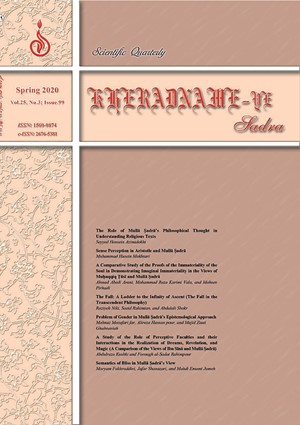-
-
List of Articles
-
Open Access Article
1 - The Fall: A Ladder to the Infinity of Ascent (The Fall in the Transcendent Philosophy)
Raziyeh Niki Saeid Rahimian Abdolali Shokr -
Open Access Article
2 - Semantics of Bliss in Mullā Ṣadrā’s View
Maryam Fakhr al-Dini Jafar Shanazari Mahdi Emami Jomee -
Open Access Article
3 - The Role of Mullā Ṣadrā’s Philosophical Thought in Understanding Religious Texts
Seyyed Hossein Azimidokht -
Open Access Article
4 - A Comparative Study of the Proofs of the Immateriality of the Soul in Demonstrating Imaginal Immateriality in the Views of Muḥaqqiq Ṭūsī and Mullā Ṣadrā
Ahmad Abedi Arani Mohammad Reza Karimi Vala Mohsen Pirhadi -
Open Access Article
5 - A Study of the Role of Perceptive Faculties and their Interactions in the Realization of Dreams, Revelation, and Magic (A Comparison of the Views of Ibn Sīnā and Mullā Ṣadrā)
Abdulreza Kushki Furugh al-Sadat Rahimpoor -
Open Access Article
6 - Problem of Gender in Mullā Ṣadrā’s Epistemological Approach
Mahnaz Mozafari far Alireza Hassanpour Maijd Ziaei Ghahnavieh -
Open Access Article
7 - Editor's Notes
Seyyed Mohammad Khamenei -
Open Access Article
8 - Sense Perception in Aristotle and Mullā Ṣadrā
Muhammad Husein Mokhtari
-
The rights to this website are owned by the Raimag Press Management System.
Copyright © 2017-2026







